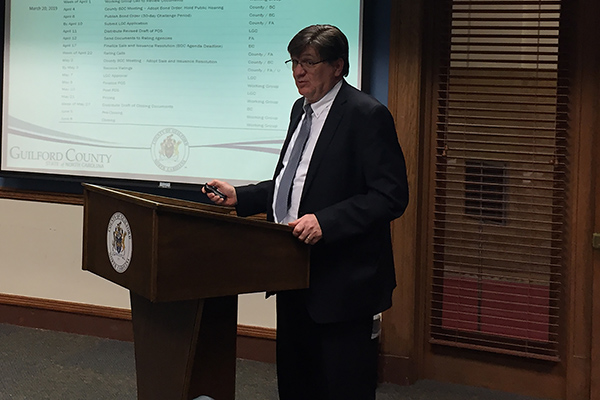At a Thursday afternoon, Feb. 7 work session of the Guilford County Board of Commissioners, county staff told the commissioners that the clock was ticking and they needed to go for it – make a big play, that is – but the board, in spite of that advice, decided to drop back and punt.
The game at hand wasn’t football but instead was the serious game of funding a host of Guilford County projects including a new animal shelter, an Emergency Services vehicle maintenance facility, a mental health center and a new headquarters for the Guilford County Sheriff’s Department – projects that add up to well north of $70 million.
The projects are considered essential for the county, but the Republican-majority Board of Commissioners doesn’t want to raise taxes and isn’t really keen on borrowing money either.
County staff has been recommending that the board use two-thirds bonds to raise the funds. That’s a local government financing method that doesn’t require voter approval and one that allows a government to borrow, in any fiscal year, up to two-thirds of the amount of money it paid back on its bonds during the previous fiscal year.
The equivalent for home owners might be a home equity loan where you can borrow money against the amount of your mortgage that you’ve paid off. And like a home equity loan it’s a financing method that means your payments increase and it takes far longer to get out of debt.
At the Feb. 7 work session in the Blue Room of the Old Guilford County Court House Guilford County Finance Director Harley Will told the commissioners that the maximum amount the board could issue this fiscal year is $57 million. Doing so, he said, would actually bring in about $61 million since, based on current market conditions, the local government bonds of the type Guilford County would issue would likely bring the county a $4-million “bond premium.”
According to county staff, the effect of the debt on the county budget wouldn’t kick in until three years after the bonds were issued but at that point the county would need a tax increase to pay off the debt. Staff said that every one-cent increase in the county’s property tax rate equates to $5.1 million in new revenue. To cover the bonds Guilford County would need an increase of more than a penny on the tax rate that would remain in effect until the bonds were paid off.
Commissioner Jeff Phillips stopped staff in the middle of that thought and pointed out there were other options even if the board does issue the two-thirds bonds.
“It doesn’t necessarily mean that the tax rates go up by this amount for this many years,” Phillips said of issuing the bonds.
He said the one-cent per $5.1 million was just a numerical equivalency and not some rule the board had to follow. He said that if the county cut costs elsewhere or saw increased revenue, the move wouldn’t require a tax increase.
At the meeting, Lawing gave the board the number he had in mind.
“What we would recommend, with the information we have today, is for the board to approve 51 or 52 million,” the county manager said.
Commissioner Hank Henning joked, “Are those the two options you’re giving us – 51 million or 52 million?”
Lawing responded, “Or, if you want to do $51,513,783 …”
That may very well have been Lawing’s first joke in a public setting since he arrived in Guilford County government about six years ago.
Several commissioners informed staff that they simply weren’t ready to make a decision since they didn’t even know the true costs of some of the project projects yet.
Lawing said that they could raise the money and not spend it all if they chose. He also said the clock was ticking since the board has to issue the two-thirds bonds by the end of June and that process must start soon if those bonds are going to be sold by then.
County staff said they needed board approval by Thursday, Feb. 21 given the timeline.
Commissioner Skip Alston, along with other commissioners, said that this was a proper topic for the board’s annual retreat, which will take place on Monday Feb. 25 and Tuesday, Feb. 26. Staff didn’t seem to like that idea but there was nothing they could do.
Will pointed out that Guilford County Cash and Debt Manager Clay Hicks was resigning at the end of February, but some commissioners joked that Hicks may just have to work really hard on his last few days with the county.
Phillips said a lot of assumptions were being made, this was a very serious matter that required more thought and he said he also didn’t like the suggestion of raising the money and keeping it in the bank for other projects as needed.
“That’s not how I roll,” Phillips said of the county essentially warehousing money.
Over staff’s objections, the discussion will now be one of the first items on the agenda at the commissioners retreat.

